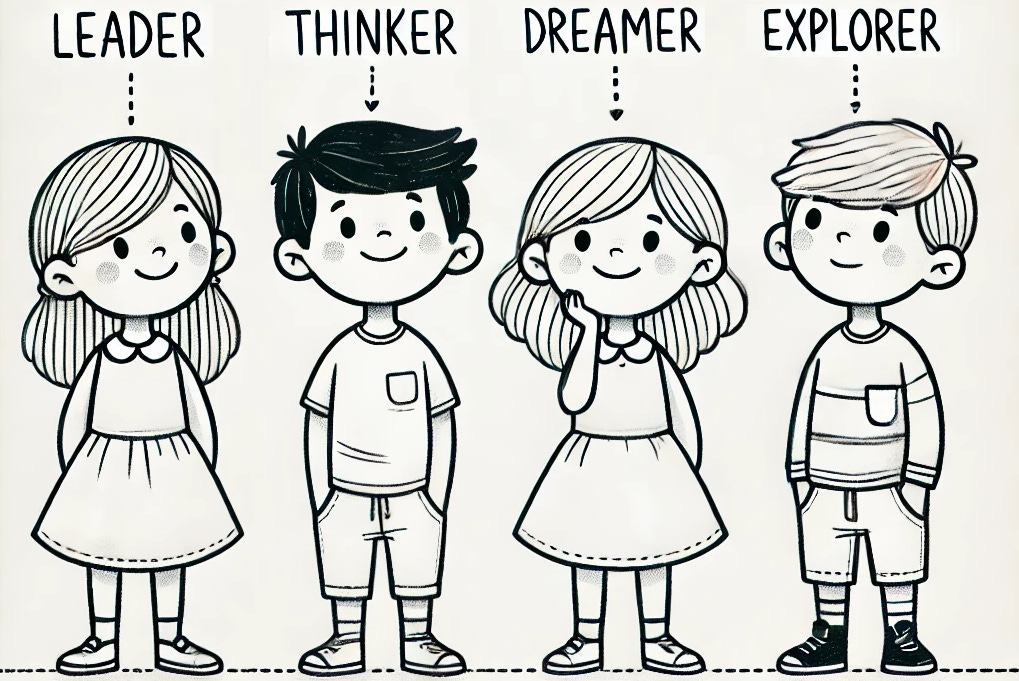#7 - What's in a name?
The benefits and downsides of labeling yourself an introvert.
Why label it?
Sometimes people ask me, “Why focus so much on introversion? Isn’t that just one aspect of your personality? Don’t labels like this ultimately become limiting?”
It’s a fair question (though I can’t help but wonder if some of these concerns stem from internalized bias). So, let’s take a closer look at the benefits—and potential pitfalls—of using these terms, starting with the positive.
Labels can be useful
I launched Powerful Introvert to bring attention to these labels for several reasons:
It’s hard to recognize cultural bias without the language to describe it. Once I started viewing workplace and social dynamics through this lens, I quickly saw how certain behaviors were unfairly rewarded while others were discouraged. Without this framework I was blind to it.
Many of us struggle with the shame rooted in these biases. The stigma against being quiet is real, and we’re conditioned to it from a young age. We criticize ourselves for preferring quiet, early nights over late ones, for not being the first to speak up, or for finding it difficult to think on our feet or navigate overwhelming situations.
Effective leadership comes in different styles, and many of us overlook quiet leaders. We even forget prominent examples like Barack Obama, Al Gore, and Mahatma Gandhi! By design, the more attention-grabbing leaders come to mind first—they’re the ones always making sure they’re seen.
Techniques for quiet leaders—and the science behind them—are not widely known. Yet there are proven ways to embrace and develop these qualities, allowing you to lead with strength while staying true to yourself in the workplace.
In short, a deeper understanding of introversion can help you better understand yourself and foster greater self-acceptance. It empowers people to speak up and challenge misconceptions about this important personality trait. It also shows us how to improve our workplaces and interactions with one another.
In a prior newsletter, I shared how Douglas Conant, former CEO of Campbell’s Soup, advocated for self-disclosure. He would openly say, “I’m just shy” to put people at ease around him, demonstrating both self-awareness and self-acceptance.
Another powerful example of embracing labels is the tradition in Alcoholics Anonymous, where members introduce themselves by saying, “Hi, I’m [name], and I’m an alcoholic.” This simple statement fosters self-acceptance and builds a sense of community—two major benefits of embracing a label.
That said, labels have their limitations.
What’s in a name?

Leave it to Shakespeare to compress this timeless question into four short words: “What’s in a name?“
Romeo’s lament about his love’s inconvenient last name hints at something deeper: the limitations of labels and language. Words fall short of capturing the richness and depth of our experiences, the essence of our personalities, or how we perceive the world. No words can fully capture that complexity for any one of us.
This idea is a common theme across many spiritual traditions, which insist that the essential realities cannot be captured in language. Words, metaphors or allegories can only point toward these truths. The Tao Te Ching’s famous opening line states “The Tao that can be named is not the eternal Tao.” Similarly, in a well-known Zen story, when a student asked a master to explain Zen, the master simply pointed at the moon—a gesture that illustrates both the metaphorical role of words as pointers to reality, and their ultimate inadequacy in capturing it.
Language is nothing more than a sequence of sounds produced by the vocal cords. At its core it’s just an abstraction, a representation of reality. The trouble arises when we start believing it could capture the essence of who and what we are. This applies just as much to terms that describe personality traits, like “introvert,” “extrovert,” or “highly sensitive person.” And these traits fall on a continuum, so each of us has our own mixture of these tendencies described in the literature. They’ll never be more than an approximate description for any one of us.
When labels are limiting
Using these labels can be both empowering and healthy—they help you recognize this aspect of your personality and embrace it. But once you’ve learned from this process, adjusted your lifestyle to be more supportive, and started living more authentically, labels can also become limiting.
For example, when you first recognize your tendencies to be “quiet” or “easily overwhelmed,” it’s important to acknowledge and accept that part of yourself as you are now. But if you become too attached to these labels, you may adopt a fatalistic mindset that limits your growth. You might start believing, “I can’t do public speaking because I’m quiet,” or “I need to leave because I can only handle an hour of socializing.”
Labels can become a crutch—an excuse to avoid discomfort or challenges—when in reality, you can develop these skills with the right knowledge, preparation, and self-care. As you become more empowered, you’ll start showing up differently. And if you’re stepping into leadership, at least some of the time, you’ll need to.
Susan Cain, author of Quiet, and Elaine Aron, pioneer researcher of high sensitivity, are themselves quiet individuals who have done much to promote self-acceptance among introverts, as well as broader acceptance of introverts as they are in the workplace and the world. Yet, they also encourage introverts to challenge themselves, push beyond their comfort zones, and embrace occasional discomfort—albeit in the kindest and most supportive way possible.
If you want to have a positive impact and share your many gifts with the world, discomfort will inevitably be part of the process for quiet people. In fact, as Cain writes, it’s the purpose behind these activities and their intended impact that motivates introverts to step into them.
I love all the content out there supporting introverts (50% of the population) and highly sensitive folks (20% of the population), because it normalizes the experience of so many of us. It’s a testament to how lopsided the culture is, that vast swaths of the population need some relief from our bizarre fixation with the “always-on” “life of the party” personality.
And yet, part of me cringes when the message so often boils down to, “Just stay home and avoid life.” To me, that ultimately becomes limiting. Only you can know how best to take care of yourself, and maybe staying in is exactly what you need tonight. But be honest with yourself—tomorrow, are you genuinely still drained, or are you letting fear hold you back?
By all means, take care of yourself. Maybe only go to that party for an hour. Maybe don’t go if you’re genuinely overwhelmed. But don’t let your current tendencies become an excuse to avoid growth or limit your experience of life.
In other words, labels are not destiny. You may be an introvert by nature, and that will never change. But if you want to live life to the fullest, don’t treat these descriptions as absolutes or allow them to define your limits.



